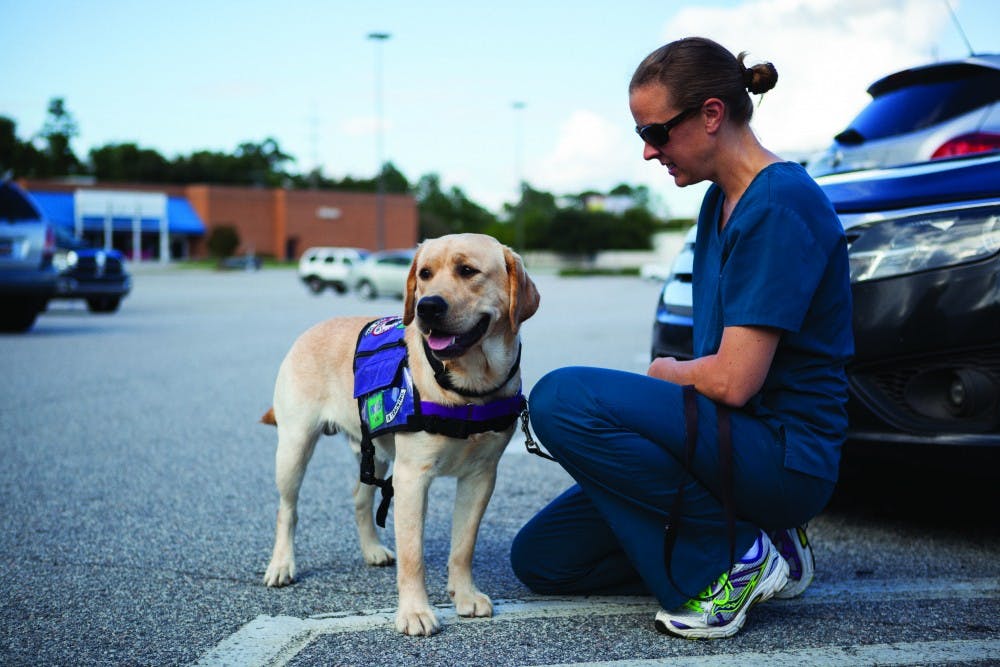The rainfall from the previous day had cleared away, leaving the morning sky a brilliant blue and the weather perfect for a walk along Greene Street. Though stands of produce from the Farmer’s Market lined either side, I hadn’t come to for them today. Rather, like many already gathered along the road, I’d come for the dogs.
The Pet-A-Pup outing, an event where service dogs in training are brought on campus to allow them to learn social skills and give college students a relaxing break from their studies, was sponsored by the Palmetto Animal Assisted Life Services, or PAALS. Dedicated to connecting service and assistance dogs with people with physical disabilities and social needs, PAALS is a locally run program that puts puppies with potential into a two-year-long training program that will ultimately teach them the skills necessary to assist their future owners in their daily lives.
“All our dogs go to prison the first year of their life,” explained Maureen Leary, a trainer at PAALS. “They go Monday to Friday, right now to Kershaw prison, and are trained by the inmates there. We go out and we train the inmates to train the dogs.”
The following year, the dogs move to the PAALS base to begin advanced training, such as basic tasks like turning on the lights or assisting with laundry, as well as with behaviors surrounding autism and PTSD.
Another key aspect of training is introducing the dogs to new people and places, all the while instilling the importance that the animal must remain calm no matter the situation. Such was the case on Greene Street today, where many dogs were wearing their service vests and in training. For the dogs in training, they could receive adoration from passersby, but only when given the command to ‘say hello’ and only so long as they kept their focus on their trainer. Should they become overly excited, a PAALS volunteer would get the dog’s attention and remind them that they were still at work.
“The more we take them out and socialize them, the more they are ready to go out in public eventually.” Leary said.
The five dogs present on Greene Street were certainly excited for the opportunity to interact with the public. One service dog in training, a four-month-old black lab puppy, was particularly excited by the new sights and smells. And the college students were glad to have him and all the other PAALS dogs. The animals were rarely spotted without a small throng of students surrounding them.
For anyone who missed the September Pet-A-Puppy event, fear not:here are many ways to get involved with PAALS. Arguably the easiest way is to donate money to the cause (with all donations tax deductible). The money is used to fund training and to assist clients in paying the tuition for team training, a mandatory step in the process of placing of a dog with their owner. But for those who would prefer a more hands-on approach, anyone can fill out an application online and attend a volunteer orientation session. There, they learn different ways to help PAALS, like fostering a dog for a weekend.
Volunteering is particularly easy for USC students because there is an on-campus partner of the organization, Cocky’s Canine PAALS, which provides a list of available weekly times to volunteer and helps with transportation to certain PAALS events, as well as building a community of like-minded students with similar interests and a passion for service.
“Cocky’s Canine PAALS volunteer at our facility and do animal husbandry … Once Cocky’s Canines are trained doing those things (cleaning the animals and amenities), we try to teach them how to groom the dogs and how to walk the dogs.”
When asked what she found most rewarding about working with PAALS, Leary said, “On a daily basis, just working with the dogs. But the culmination is where you do the team training and the dog gets placed with somebody, and you see the difference it can make in someone’s life, restoring their independence and letting them live a full life. We have parents of children with autism tell us it’s their child’s first time sleeping through the night … It makes an unbelievable difference.”
To find out more about PAALS, visit https://www.paals.org/ or call (803) 788-7063. To learn more about Cocky’s Canine PAALS, email SOPAALS@mailbox.sc.edu or visit their Facebook page, Cocky’s Canine PAALS at USC.



